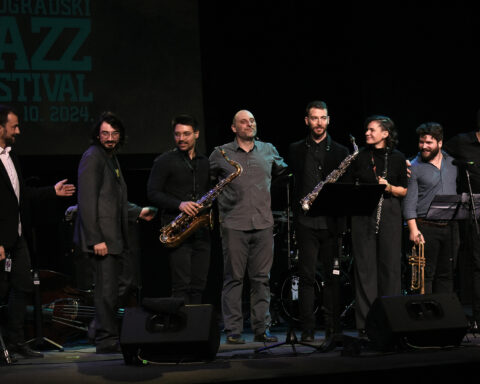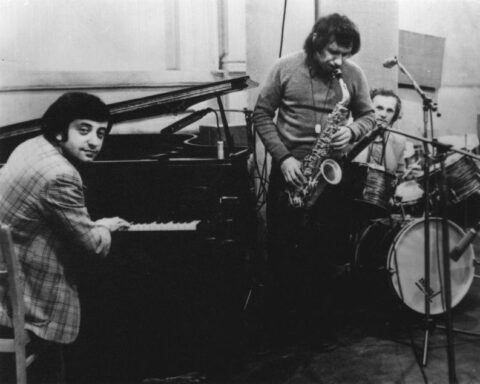New York, January 13, 2011 — On Saturday, January 8, members of the JJA as well as interested musicians and industry representatives slowly kept trickling shortly after what was supposed to be an 11:00 a.m. start time for a discussion on the prospects for long-form journalism. (The tardiness possibly because of too much fun at the previous night’s Winter Jazzfest.)
This was the kickoff panel of the JJA’s 2011 “New Media for New Jazz” conference. The moderator, JJA President Howard Mandel, introduced the panel members: Marc Myers, blogger and propietor of JazzWax.com and contributor to The Wall Street Journal; David Hajdu, author, music critic for The New Republic and professor at the Columbia University Graduate School of Journalism; and Larry Blumenfeld, contributor to The Wall Street Journal, The Village Voice and editor-at-large of Jazziz. Mr. Myers spoke first and, in regard to long form journalism, held firm with his assertion that today people don’t like to read.
“Nobody wants to read anymore. Reading is just not fun. Nobody likes it,” Myers stated. “They do it because they have to. It’s the fastest way and the only way to get information on a sheet of paper into our brains. But it’s not interesting.”
Myers believes that non-reading-in-favor-of-screen-scrolling, our current method for consuming information, makes the skill of writing short, fast-paced pieces an absolute for journalists, as readers are navigating away from longer articles on the web.
Hajdu was not as pessimistic. “Nobody likes to read? That’s not only preposterous, it’s offensive to my values,” Hajdu calmly objected. “Using history as the evidence I don’t see any reason to think that long-form journalism will disappear. I do think that we might not recognize it because it will take a different form.” Myers later retorted that he has extensive experience in the world of traditional print media and a high regard for the culture of reading. His larger point was that we have to meet web-based readers where they are, not where we might like them to be.
Hajdu went on to explain that when media platforms change, people panic. And although the way in which long-form writing exists now will change, it may be for the best.
“There is no question we’re going to see fewer 10,000 word pieces, and the value, I think, of those kinds of pieces was always suspect,” Hajdu said. “But I think we’ll continue to see something that is equivalent and maybe even better than traditional long-form writing, on the web, but the material will not appear all at once.”
According to Hajdu, this new form may already exist. Bloggers come back to subjects over time, add new material, and even invite other writers with differing opinions to contribute, and of course welcome reader’s comments, the end result being something larger than what was originally presented.
Larry Blumenfeld argued that what makes for compelling writing has not in fact changed. “I think as a writer for print, and I should probably alter my approach a little bit. But I don’t think what goes on electronically alters the writing process,” Blumenfeld said. “I do think the context for writing has changed.”
Blumenfeld went on to explain that even the description of this panel, which stated that a long-form piece starts at around 1000 words, proves that the context for writing has changed. “To me, five years ago none of us would have thought that 1000 words would be considered long,” he stated. But he went on to tell us that at Marc Myers’ own blog, or at pianist Ethan Iverson’s blog Do the Math (two of the most heavily trafficked jazz blogs), we still find well written, lengthy pieces that are meant for people who want to read.
All three writers basically agreed that content is still king, no matter how fast it reads, or how long in form it appears. And it seems comforting if we can take away from this discussion that no matter how or where information needs to be presented, fundamental and compelling writing will remain a constant.






It does not strike me as wise to pander too readily to the cultural attention deficit disorder brought on by the prestidigitizations of the web, which, by the way, are not without precedent: television news sound bytes, and dumbed-down truncated-form news publications come to mind in this regard. Nor can we ignore it, but neither must we be controlled or limited by it.
One great advantage of web publication over paper is liberation from the limitations of editorial space imposed by printing costs, so that longer pieces can be as easily published as shorter ones. Not that longer is necessarily always better (just as too many CDs would have made better LPs had the music been better edited) but to not exercise that option when it is available at virtually no additional cost seems arbitrarily unreasoned. The concept that a writer should be paid more for a longer piece than a shorter one still applies - but for online publication, since there's too often no payment at all, the longer form can at least give writers some satisfaction by allowing their efforts to be savored - or endured - in full. And if a reader finds the verbiage boring, the rest of the cyberworld is but a click away. But at least the long form will be there for those readers who want more than just a superficial skim chosen for sizzle rather than substance.
Thank you, Paul, for a succinct and informative report on one of the JJA sessions I missed!